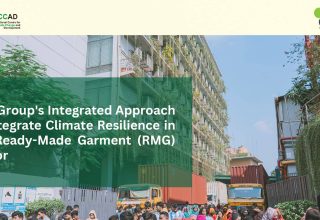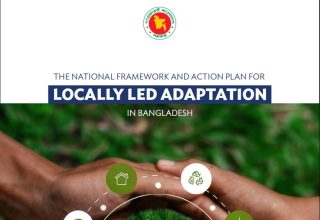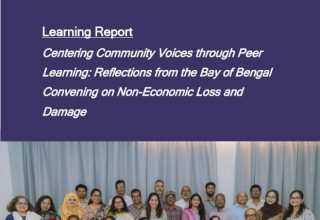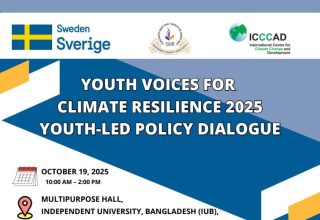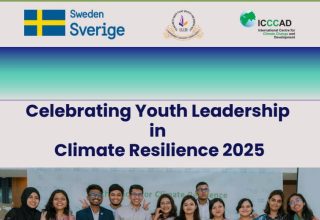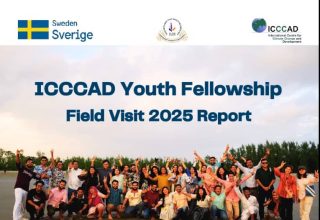In Hatcliffe extension, an informal settlement located in the northern part of Harare, the capital of Zimbabwe, a group of young people are leading the fight against the pandemic. They are building awareness, adapting their businesses to promote hygiene and encouraging fellow young people to contribute to community well-being. Artwell Nyirenda reports.
This is the eighth in a series of stories from ‘Voices from the Frontline’ by ICCCAD and CDKN.
Hatcliffe extension was once a holding camp for urban migrants coming from different parts of Harare. Young people between the age of 15 and 30 constitute a higher percentage of the community’s population. Social and economic challenges are prevalent in the area, as the young often get involved in illegal activities for survival. The majority of Hatcliffe’s residents work in construction and informal trading, and few are formally employed.
Continuous expansion of the area has further exacerbated the challenges in accessing services, particularly water and sanitation. Communal boreholes are the only source of water, as tap water is not available. The community is struggling to meet the growing demand for water with a limited number of boreholes, many of which are dysfunctional, resulting in long queues for water collection.
News of the COVID-19 pandemic and its consequent safety protocols has added to the community’s existing fragilities. Waiting in a queue to collect water at communal boreholes is a daily reality for the residents of the Hatcliffe extension – increasing the risk of virus transmission. Until now, no positive cases have been found in the area. However, soon after hearing about COVID-19, everyone has been terrified to risk their lives while scrambling for scarce water. With the onset of the lockdown, naturally the demand for water has significantly increased and large crowds have gathered near the boreholes.
In Hatcliffe extension, the youth have always been at the forefront when it came to crisis management. Lonica Kenneth is a young female resident in the area, and a member of the Zimbabwe Young Peoples’ Federation (ZYPF), and its sub-group, Metro Focus Detergents Filming Group. ZYPF mobilises young people to influence positive change in their communities through documenting and sharing their lived experiences with relevant local authorities and other stakeholders.
The Metro Focus Detergents Filming Group is under the Safe and Inclusive Cities project, a youth-led project funded by Plan International, and consists of 20 members, including Lonica. Saving is encouraged within the group, and the members have been practising saving 10 bond notes (approximately USD 0.10) per week. They also make and sell liquid soaps, detergents, liquid gas and different arts and crafts. “The Safe and Inclusive Cities project has been an eye opener, as I have been made aware of opportunities to generate income, and participate in my community. I have realised I can make detergents that will help my family and community,” shares Lonica.

With her own savings, Lonica began a detergent business in June 2019, producing and distributing liquid soap within her community. However, the lockdown has caused her business to suffer and Lonica has had to redesign her production strategy. “My business has declined since the lockdown as I was unable to purchase raw materials for production. But I also realised that there is a growing demand for soaps and sanitisers during this pandemic, and I really wanted to help my community members during this crucial time” says Lonica.
Along with the other members, Lonica identified an opportunity to boost their businesses and support their community during the crisis. She approached Safe and Inclusive Cities to finance her business. “Thanks to their support, I was able to produce sufficient liquid soaps. They helped me to buy the raw materials required for production,” Lonica adds. With increased sales, she is now saving 20 bond notes per week. Because of the high levels of poverty in her community, she sold the products at a very low price so that people can afford them. “We are also distributing hand washing buckets, sanitisers and soaps to community members who are most impacted,” Lonica further points out.
In addition to their businesses, Lonica and her group has also been involved in raising awareness of COVID-19 preventative measures . “My group has managed to distribute hand washing soaps near community boreholes to promote hygiene. We also influenced community leaders to regularly disinfect and monitor the water points to ensure safety. These public spaces have improved. Chaos is avoided as people adhere to protocols set by the leadership” she argues. The community youth members have also asked relevant government ministries for further training so they can disseminate information more accurately.
Hatcliffe extension residents are fully cooperating in monitoring the water points and advocating for increased youth engagement. “First thing in the morning before anyone comes, I set out the drum, and the bucket with water and soap. Everyone must wash their hands before using the borehole handle. I also use sanitiser to disinfect the borehole handle, to ensure it is clean for everyone to use,” says Steven Nyamapfeka, a local leader in Hatcliffe.
“We are requesting outreach programmes on COVID-19 issues, as we don’t have enough information. If the virus spreads in this community, we will struggle to survive because we are not practising social distancing. More youth can be engaged to disseminate vital information,” shares Phillip Matamande, a member of the community. Residents have highlighted the need for masks and other protective gear, and the implementation of social distancing. They have also requested the Ministry of Health to increase the supply of chlorinated water.
Despite numerous hurdles, Lonica is hopeful that if the youth continue to work together, they will be able to overcome the challenges brought on by the COVID-19 crisis. “I am happy that I am able to play a role during this difficult time, and inspire young girls to lead initiatives for the betterment of our community. Together we can tackle the COVID-19 pandemic!” says Lonika.
Interviewers’ perspective
As we are witnessing during COVID-19, young people from around the world are being innovative and leading initiatives within their communities to tackle the global crisis. Lonica, and others like her, are taking steps to support their communities through active participation. They have been influencing and communicating with leaders in understanding the dynamics of their communities. It is important that the youth realise their potential and the crucial roles they can play within their communities and lead the way for a better, brighter future.
About the interviewer
Artwell Nyirenda is a program officer at Dialogue on Shelter for the Homeless People in Zimbabwe. He is working with young people in slum settlements in documenting the daily experiences in their communities for advocacy purposes.
About the interviewees
Lonica Kenneth lives in Hatcliffe extension and actively participates in community development platforms and programs. Through her work, she has inspired many young people who have joined her in transforming their communities.
Steven Nyamapfeka, is a local elderly man living in the Hatcliff extension for several years. He is also the Secretary of the Water Committee of Hatcliff.
Phillip Matamande is a local community leader and vice chairperson of the Water Committee of Hatcliffe.



